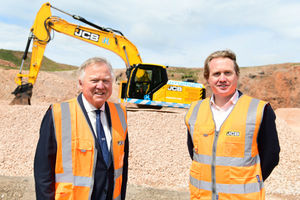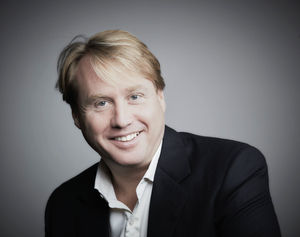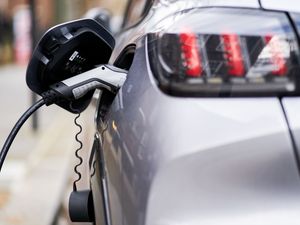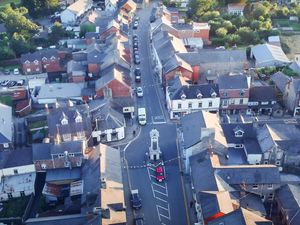Could hydrogen - and not electricity - be the answer to our transport needs?
A giant factory, making batteries for thousands of electric cars, is crucial to spearhead a green revolution in the heart of the West Midlands, says Andy Street. The regional mayor says a 'gigafactory' represents a once-in-a-lifetime opportunity to 'build back better', creating thousands of environmentally friendly jobs to aid the recovery from Covid.
His opponent, Birmingham MP Liam Byrne, accuses the Government of dragging its feet. Without major subsidies, Britain will miss the boat, handing the initiative to our European competitors.
One thing they both agree on, though, is that plug-in, battery-driven electric cars represent the future of Britain's automotive industry. And that a huge factory making batteries for cars buses and lorries is not only essential to the economy, it is also imperative it is built here.
They are both wrong, says Jo Bamford. The grandson and namesake of JCB founder Joseph Cyril Bamford, says Britain's political and economic leaders should forget about gigafactories, which are yesterday's technology, and jump a generation to the next big thing – hydrogen fuel cells.
Fuel cells work by passing compressed hydrogen gas over a precious metal, usually platinum, which draws electrons out of the gas, producing an electric current to drive a motor, and causing the gas to react with oxygen from the air, turning it into water. Unlike 'conventional' electric cars, hydrogen-powered vehicles do not carry heavy batteries and do not need charging for extended periods of time.
They are fuelled in pretty much the same way as a petrol or diesel vehicle, and the only emissions are steam.
The technology has been around for a while. General Motors first tested its hydrogen-powered Electrovan in 1966, and they have been used to provide the electricity supply on all the US space shuttles.
But the biggest obstacle to date has been cost. In 2019, the first hydrogen-powered production car went on sale in the UK, the Toyota Mirai, with motoring writer James May being among the first to take delivery. But while it blazed a trail for new technology, price has always been a problem, with the Mirai costing £66,000, almost three times the price of the cheapest Ford Mondeo.

But Mr Bamford, who founded green hydrogen production company Ryse in 2018, and then took over bus manufacturer Wrightbus last year, believes that an announcement by the Government last week could finally make hydrogen viable.
At the moment Wrightbus produces diesel, battery-powered and hydrogen buses. But while battery buses have become more common, bringing the price down to about £250,000 – roughly the same as a diesel bus – small production numbers meant that hydrogen buses cost about double that.
At the moment, a battery-powered bus costs approximately £250,000, about the same as a diesel bus, but a hydrogen bus is around double that.
Mr Bamford, who bought London bus manufacturer Wrightbus with a view to turning it into a leader in hydrogen technology, says the problem has always been scale; the market has been too small to make hydrogen vehicles competitive.
While there are three manufacturers in the UK at the moment with the capacity to build hydrogen buses – his company, Alexander Dennis Ltd, and Leeds-based Optare – the number of them in services is vanishingly small.
Wrightbus has supplied 20 of them to Transport For London, there are a small number in Aberdeen, and they are due to be introduced in Birmingham and Liverpool this year. But Mr Bamford is banking on the Government's pledge last week to invest £3 billion in 4,000 zero emissions buses.
"If 3,000 of those went to the three companies in the UK to build hydrogen buses, it would bring the cost down to about that of a diesel bus," he says.
"It is fantastic news that the PM is moving forward with his plans to invest in 4,000 UK-made zero emission buses. We welcome the PM's urgency to deliver these buses and we have a shovel-ready plan, with our partners in National Express and Transport for the West Midlands, to get 200 hydrogen buses on the streets of Birmingham in time for next summer's Commonwealth Games."
Not everyone is convinced. Elon Musk, chief executive of electric-car manufacturer Tesla, has described the technology as 'fool sells', 'mind-bogglingly stupid', and saying that there is no way it will ever succeed.
"It’s just very difficult to make hydrogen, store it, and use it in a car. Hydrogen is an energy storage mechanism," he said in a 2015 interveiw. "It’s not a source”

But it seems he is in a minority. A survey of 1,000 senior motor-industry executives carried out by KPMG in 2017 found they believed hydrogen fuel cells had a better long-term future than conventional electric cars, with 78 per-cent saying they would represent 'a real breakthrough'. The short refueling time was seen as a major advantage, with 62 per cent saying that the infrastructure changes required for battery-powered vehicles likely to be their undoing.
Mr Bamford argues that Britain should pull away from the rush to invest in battery technology, saying that the UK – and it's European neighbours – missed the boat many years ago.
"China has 73 per cent of the battery market, and when somebody has that sort of dominance, it’s going to be difficult to knock them off their perch," he says.
"China controls every part of the supply chain, it owns all the cobalt, copper and lithium mines, whereas if we invest in hydrogen in this country, we can steal a march."
The other exciting thing about hydrogen fuel-cell technology is that it's not limited to cars, buses or lorries. Mr Bamford reckons with a couple of years it would be possible to have hydrogen-powered trains, and hydrogen-powered ships three years after that. In the longer term it could power aircraft, and provide sustainable energy for homes.
"Let’s do what China did for batteries with hydrogen. Let’s get it going in this country, let’s get it going in one area as quickly as possible, get the volume up in that area – and once you’ve got costs down and you’ve the cheapest cost of everything in your own domestic market, you then export that around the world."
He says a new industrial revolution in hydrogen technology could rejuvenate the manufacturing heartlands of the West Midlands, pointing out that Staffordshire-based JCB – now run by his father Lord Bamford – is already producing hydrogen-powered diggers.
"The EU's figures estimate that hydrogen will create 30 million more jobs by 2040," he says.




